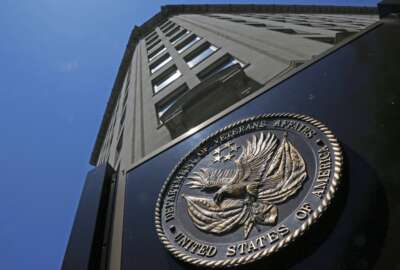VA secretary admits ‘massive mistakes’ over improper executive bonuses, rejects calls for firings
VA Secretary Denis McDonough says a “series of massive mistakes” led to his department approving nearly $11 million in bonuses to ineligible career executives.
VA Secretary Denis McDonough says a “series of massive mistakes” led to his department approving nearly $11 million in bonuses to career executives who weren’t eligible to receive them.
“You cannot read the statute and say that this was an acceptable use of that statute,” McDonough told members of the House VA Committee at a hearing Tuesday.
VA’s inspector general office, in a report released last month, found the department improperly awarded $10.8 million in critical skills incentives (CSIs) to more than 180 executives last fall.
Congress authorized these incentives under the toxic-exposure PACT Act to help the VA retain employees with in-demand skills, or skills that are in short supply, and serve a mission-critical need.
“It’s hard for me to read the statute and conclude that there’s no executives in headquarters that could qualify for a CSI. And consistent with that, we will look at that if there are places we need a CSI,” McDonough said. “Similarly, there is no way to read the statute to conclude that every senior executive in headquarters absolutely deserved one.”
McDonough said the VA has recouped about 92% of the bonuses paid to executives, and that the department has new procedures in place to ensure it awards incentives in a way that’s “very specific, individual and skill-driven.”
“This is why we are reviewing the entire process on these,” he said.
The VA, however, is not canceling critical skills incentives that went to 197 career executives in the field, outside VA’s central office in Washington, D.C.
“I’m not ready to opine on this completely, because the review is ongoing. But the evidence to date suggests that they were handled in a process much more consistent with the policy that we laid out in 2023 — meaning with individual justifications, based on those individuals with specific market analyses to make the case that this is a particular skill in those markets to keep those personnel,” McDonough said.
McDonough said the VA can justify these awards as retention incentives, given “churn” among VA network and medical center directors.
“I have believed and continue to believe that those investments are important to keep that critical leadership cadre,” he said.
‘They blew the whistle’
McDonough said he found out about the bonuses to VA executives on Sept. 13 last year, after getting a call from VA’s chief financial officer.
“They blew the whistle, because they saw these large payments going out of the Finance Service Center. That was speaking truth to power. That was calling out a challenge. That was an important internal check — one we rely on, on a regular basis,” McDonough said.
After learning about the bonuses, McDonough notified VA Committee Chairman Mike Bost (R-Ill.) in a phone call, and asked the VA’s inspector general office to investigate.
“In fact, it was me who called you to tell you about it. It was me who asked the inspector general to investigate, and it was me who stopped and recouped,” McDonough told Bost at the hearing.
In addition to canceling and recouping the bonuses, McDonough rescinded his delegation of authority, which allowed VA under secretaries to approve their own senior executives’ awards.
Under the current process, McDonough must approve any decision for a senior executive to receive a critical skills incentive.
In addition to implementing the VA OIG’s recommendations, McDonough said he’d be open to Congress advancing legislation that would allow lawmakers to have a more active role in overseeing these critical skill incentives.
“If you all think that it’s appropriate to take a hard look at how we administer these, we’d like to work with you on that,” he said.
‘The blame rests with me’
McDonough, however, rejected calls from Republicans to fire Under Secretary for Health Shereef Elnahal, Under Secretary for Benefits, VA Deputy Secretary Tanya Bradsher or top human resources officials.
“I continue to have confidence in our under secretaries because of their strong performance and the performance of their team on the implementation of the many authorities that we have — and because of the forthright way we’ve handled this scandal — naming it, owning it, learning from it, including appearing before you today,” he said.
The committee called on Elnahal and Jacobs to testify at Tuesday’s hearing. However, McDonough said he chose to testify before lawmakers because the decision to award these bonuses happened under his leadership.
“At the end of the day, there’s blame to go around here. but the blame rests with me. I should have put this into it the governance structure that I’ve built,” McDonough said.
Among its recommendations, VA OIG says McDonough “should take whatever administrative actions, if any, he deems appropriate related to the personnel involved in the process for granting CSIs for VA central office executives.”
“It is not a recommendation that we do lightly,” VA Inspector IG Michael Missal said, adding that agency IGs don’t have any authority to take disciplinary action, or even recommend disciplinary action.
Bost (R-Ill.) said “VA employees feel betrayed and let down” by VA’s handling of these bonuses.
“I know that some of the bonuses have been clawed back, but as far as I see, the same leaders who allowed, planned, and made these poor decisions remain in power,” Bost said.
Ranking Member Mark Takano (D-Calif.) said the VA “missed opportunities” to stop the improper bonuses, but said the bonuses account for 0.3% of the total critical skills incentives awarded under PACT Act authorities.
“I’m grateful to those VA leaders and employees who voiced their concerns. And I am grateful to Secretary McDonough for heeding those warnings, course correcting and self-reporting to the inspector general and promptly informing Congress once he became aware of the issues,” Takano said.
As of this April, the VA has awarded more than 41,000 CSIs worth $340 million. The average award is about $8,319. More than 90% of CSIs went to housekeepers, food service workers, police and HR specialists eligible to receive them.
McDonough said pay incentives under the PACT Act remain crucial to retain employees with “very critically important skills to veterans.”
“Retention rates are the highest they’ve been in years. Quit rates are at the lowest they’ve been in years. So we have demonstrated our ability to find that balance,” he said.
‘There were large failures’
VA senior executives received the maximum 25% of base pay allowed under the PACT Act. The awards ranged from $39,000 to $100,000.
VA OIG found the Veterans Health Administration and Veterans Benefits Administration authorized the maximum incentive to these executives without data or market analysis supporting those decisions.
VA HR officials had to review the awards before they went out, but Missal said they “gave undue deference to VHA and VBA leaders and signed off on the awards without elevating or resolving staff concern.”
“Staff within human resources had real concerns, identified the problems here, elevated it to then the head of the office, who then essentially ignored the concerns and just moved forward,” Missal said. “So the controls that were in place just didn’t work here. There were large failures.”
Senior executives in VA’s central office received bonuses meant for employees with high-demand skills. But Missal said VHA provided a short, identical paragraph on a single form to justify the bonuses to 148 of its senior executives. VBA, he added, provided more detail, but not enough to justify the bonuses.
“They had one explanation for all the VBA executives, one explanation for all the VHA. That’s taking all those people who have different roles and responsibilities, grouping them all together and saying, ‘We think they should because of this reason.’ Neither one of the explanations for why was adequate,” he said.
Missal said the PACT Act “gives a lot of authority and discretion to VA” to define a critical or high-demand skill.
VA required its leaders to provide market analysis to justify CSIs based on high-demand skills — but VHA and VBA didn’t provide that data.
Missal said VA policy did not require the Office of General Counsel to review the approval of the critical skills incentives, and likely would not have gotten a review for its attorneys, had the acting deputy secretary not requested such a review.
“This was a new authority. And you would think you would want to look at it very carefully as you’re implementing it, including having people with legal expertise to review it,” Missal said.
Among his recommendations, Missal urged the VA’s Office of General Counsel to have greater oversight of these payments.
“You had more junior lawyers reviewing it who just missed the issues. Our recommendation is to make sure for things that have reputational financial risks, to make sure you have a senior lawyer looking at this to make sure things are done properly,” he said.
Copyright © 2025 Federal News Network. All rights reserved. This website is not intended for users located within the European Economic Area.
Jory Heckman is a reporter at Federal News Network covering U.S. Postal Service, IRS, big data and technology issues.
Follow @jheckmanWFED





